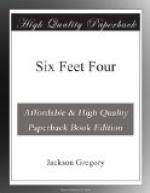Her anger steadied her. Her brain had gone hot with it; now it went cool, cold. She was holding the envelope in her hands when Pollard came to the door; now she tossed it back to the basket carelessly and still kept her back to the door. She was humming a little song softly when she picked up the book she had come for and turned with it in her hand as though to leave the room.
But in spite of her second of preparation she started when she saw Henry Pollard’s face. She had known that it could look hard and cruel, that it could grow dark and threatening. But she saw now a look in the hard eyes, about the sinister mouth, which sent a spurt of terror up into her heart. Here was a man who could kill, would kill if he were driven to it. She read it in his eyes in that flash of a glance as she might have read it in big printed letters. If he came to believe that there was actual danger to him from her knowledge he would find a way to keep her silent.
“Well?” Pollard said steadily.
He came into the room and closed the door softly behind him. Now there was no tell-tale expression in his tone and all expression had gone out of his eyes.
Even then, though her heart beat quickly and the colour wavered in her cheeks, she managed to look at him steadily and to answer collectedly:
“It looks like I’d been playing Paul Pry, and that you’d caught me, doesn’t it?”
She even laughed softly, and went on:
“I came down for a book. Then I noticed this.” She picked up the envelope again, holding it out toward him. “You see I recognized it!”
“There are lots of yellow envelopes,” he answered colourlessly, his eyes sharp points of light upon hers. “What about it?”
“I am not a lady detective,” she smiled back, taking a sudden keen delight in the knowledge that she had taken the right tack, and that she was puzzling Pollard. “But it is quite obvious that you’ve got your money back! Why didn’t you tell me?”
“There are lots of yellow envelopes,” he repeated, speaking slowly, and she knew that his brain was as busy as her own. If the moment held danger for her, then it held danger no less for him. “They are common enough. What makes you think that this one...”
“Oh, but I know,” she broke in lightly. “You see I remembered Mr. Templeton getting this smudge of ink on it. He called my attention to it, the dear, precise old banker that he is, and wanted to give me a clean one. Did Mr. Thornton get frightened and bring your money back?”
For a moment he did not answer. She knew that he was measuring her with those shrewd eyes of his, looking for a false sign, just the twitch of a muscle to tell him that she was playing a part. And she gave no sign.
“No,” he said at last. “Thornton did not bring it back. And even if you were a lady detective you might make a mistake now. I haven’t seen a cent of the money.”




